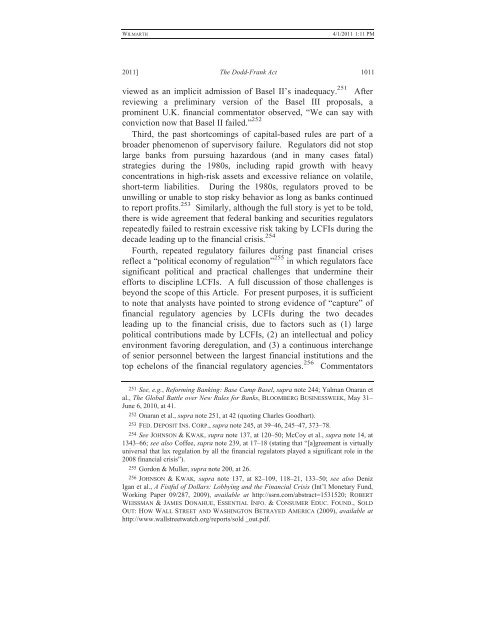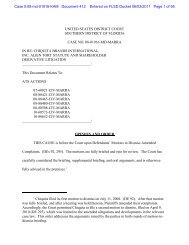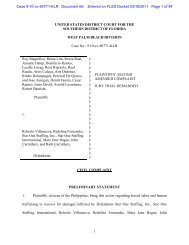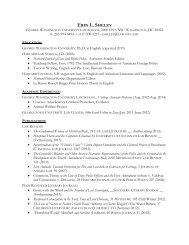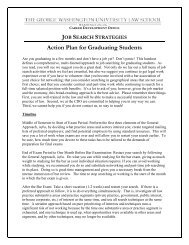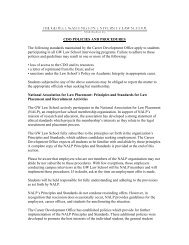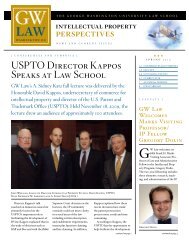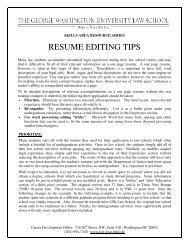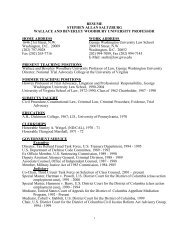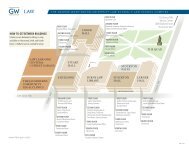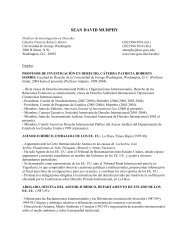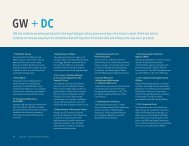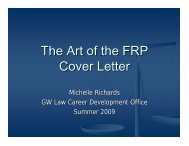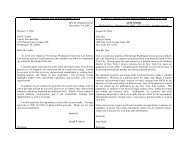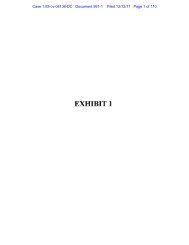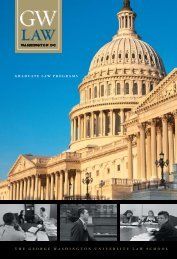CLE Materials for Panel #1 - George Washington University Law ...
CLE Materials for Panel #1 - George Washington University Law ...
CLE Materials for Panel #1 - George Washington University Law ...
You also want an ePaper? Increase the reach of your titles
YUMPU automatically turns print PDFs into web optimized ePapers that Google loves.
WILMARTH<br />
4/1/2011 1:11 PM<br />
2011] The Dodd-Frank Act 1011<br />
viewed as an implicit admission of Basel II’s inadequacy. 251 After<br />
reviewing a preliminary version of the Basel III proposals, a<br />
prominent U.K. financial commentator observed, “We can say with<br />
conviction now that Basel II failed.” 252<br />
Third, the past shortcomings of capital-based rules are part of a<br />
broader phenomenon of supervisory failure. Regulators did not stop<br />
large banks from pursuing hazardous (and in many cases fatal)<br />
strategies during the 1980s, including rapid growth with heavy<br />
concentrations in high-risk assets and excessive reliance on volatile,<br />
short-term liabilities. During the 1980s, regulators proved to be<br />
unwilling or unable to stop risky behavior as long as banks continued<br />
to report profits. 253 Similarly, although the full story is yet to be told,<br />
there is wide agreement that federal banking and securities regulators<br />
repeatedly failed to restrain excessive risk taking by LCFIs during the<br />
decade leading up to the financial crisis. 254<br />
Fourth, repeated regulatory failures during past financial crises<br />
reflect a “political economy of regulation” 255 in which regulators face<br />
significant political and practical challenges that undermine their<br />
ef<strong>for</strong>ts to discipline LCFIs. A full discussion of those challenges is<br />
beyond the scope of this Article. For present purposes, it is sufficient<br />
to note that analysts have pointed to strong evidence of “capture” of<br />
financial regulatory agencies by LCFIs during the two decades<br />
leading up to the financial crisis, due to factors such as (1) large<br />
political contributions made by LCFIs, (2) an intellectual and policy<br />
environment favoring deregulation, and (3) a continuous interchange<br />
of senior personnel between the largest financial institutions and the<br />
top echelons of the financial regulatory agencies. 256 Commentators<br />
251 See, e.g., Re<strong>for</strong>ming Banking: Base Camp Basel, supra note 244; Yalman Onaran et<br />
al., The Global Battle over New Rules <strong>for</strong> Banks, BLOOMBERG BUSINESSWEEK, May 31–<br />
June 6, 2010, at 41.<br />
252 Onaran et al., supra note 251, at 42 (quoting Charles Goodhart).<br />
253 FED.DEPOSIT INS.CORP., supra note 245, at 39–46, 245–47, 373–78.<br />
254 See JOHNSON &KWAK, supra note 137, at 120–50; McCoy et al., supra note 14, at<br />
1343–66; see also Coffee, supra note 239, at 17–18 (stating that “[a]greement is virtually<br />
universal that lax regulation by all the financial regulators played a significant role in the<br />
2008 financial crisis”).<br />
255 Gordon & Muller, supra note 200, at 26.<br />
256 JOHNSON &KWAK, supra note 137, at 82–109, 118–21, 133–50; see also Deniz<br />
Igan et al., A Fistful of Dollars: Lobbying and the Financial Crisis (Int’l Monetary Fund,<br />
Working Paper 09/287, 2009), available at http://ssrn.com/abstract=1531520; ROBERT<br />
WEISSMAN &JAMES DONAHUE, ESSENTIAL INFO. &CONSUMER EDUC. FOUND., SOLD<br />
OUT: HOW WALL STREET AND WASHINGTON BETRAYED AMERICA (2009), available at<br />
http://www.wallstreetwatch.org/reports/sold _out.pdf.


